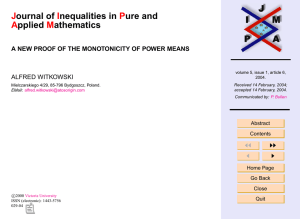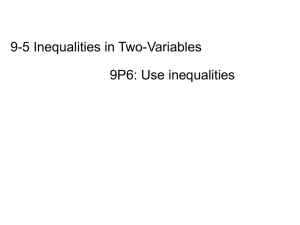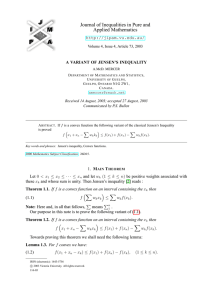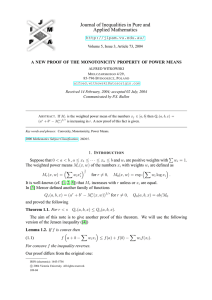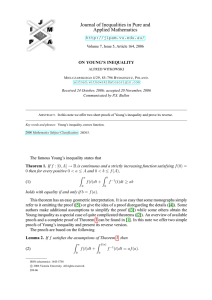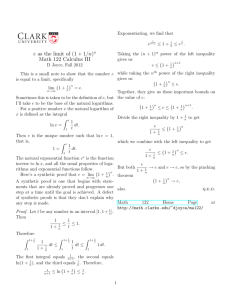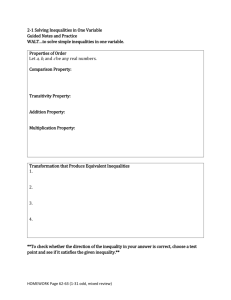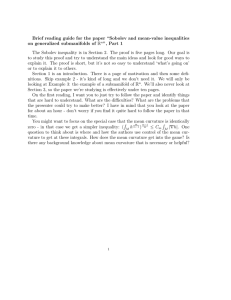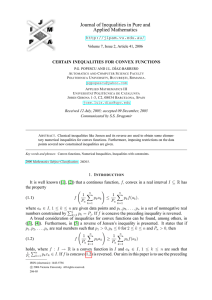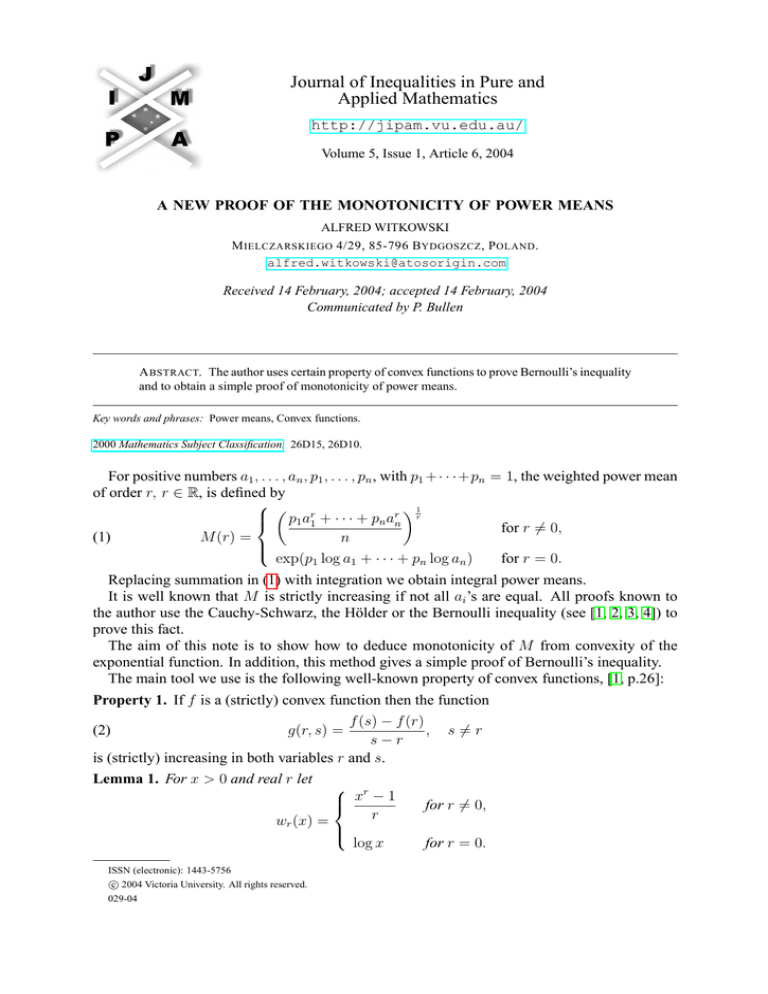
Journal of Inequalities in Pure and
Applied Mathematics
http://jipam.vu.edu.au/
Volume 5, Issue 1, Article 6, 2004
A NEW PROOF OF THE MONOTONICITY OF POWER MEANS
ALFRED WITKOWSKI
M IELCZARSKIEGO 4/29, 85-796 B YDGOSZCZ , P OLAND .
alfred.witkowski@atosorigin.com
Received 14 February, 2004; accepted 14 February, 2004
Communicated by P. Bullen
A BSTRACT. The author uses certain property of convex functions to prove Bernoulli’s inequality
and to obtain a simple proof of monotonicity of power means.
Key words and phrases: Power means, Convex functions.
2000 Mathematics Subject Classification. 26D15, 26D10.
For positive numbers a1 , . . . , an , p1 , . . . , pn , with p1 +· · ·+pn = 1, the weighted power mean
of order r, r ∈ R, is defined by
1
r
r
p1 a1 + · · · + pn an r
for r 6= 0,
(1)
M (r) =
n
exp(p1 log a1 + · · · + pn log an )
for r = 0.
Replacing summation in (1) with integration we obtain integral power means.
It is well known that M is strictly increasing if not all ai ’s are equal. All proofs known to
the author use the Cauchy-Schwarz, the Hölder or the Bernoulli inequality (see [1, 2, 3, 4]) to
prove this fact.
The aim of this note is to show how to deduce monotonicity of M from convexity of the
exponential function. In addition, this method gives a simple proof of Bernoulli’s inequality.
The main tool we use is the following well-known property of convex functions, [1, p.26]:
Property 1. If f is a (strictly) convex function then the function
f (s) − f (r)
(2)
g(r, s) =
, s 6= r
s−r
is (strictly) increasing in both variables r and s.
Lemma 1. For x > 0 and real r let
r
x −1
r
wr (x) =
log x
ISSN (electronic): 1443-5756
c 2004 Victoria University. All rights reserved.
029-04
for r 6= 0,
for r = 0.
2
A LFRED W ITKOWSKI
Then for r < s we have wr (x) ≤ ws (x) with equality for x = 1 only.
Proof. Applying the Property 1 to the convex function f (t) = xt we obtain that g(0, s) = ws (x)
is monotone in s for s 6= 0. ObservationR that lims→0 ws (x) = w0 (x) completes the proof.
x
Alternatively we may notice that wr (x) = 1 tr−1 dt, which is easily seen to be increasing as a
function of r.
As an immediate consequence we obtain
Corollary 2 (The Bernoulli inequality). For t > −1 and s > 1 or s < 0
(1 + t)s ≥ 1 + st,
for 0 < s < 1
(1 + t)s ≤ 1 + st.
Proof. Substitute x = 1 + t in the inequality between ws and w1 .
Now it is time to formulate the main result.
Let I be a linear functional defined on the subspace of all real-valued functions on X satisfying I(1) = 1 and I(f ) ≥ 0 for f ≥ 0.
For real r and positive f we define the power mean of order r as
(
I(f r )1/r
for r 6= 0,
M (r, f ) =
exp(I(log f ))
for r = 0.
Of course, M may be undefined for some r, but if M is well defined then the following holds:
Theorem 3. If r < s then M (r, f ) ≤ M (s, f ).
Proof. If M (r, f ) = 0 then the conclusion is evident, so we may assume that M (r, f ) > 0.
Substituting x = f /M (r, f ) in Lemma 1 we obtain
f
0 = I wr
M (r, f )
s
M (s,f )
M (r,f ) − 1
for s 6= 0,
f
s
(3)
≤ I ws
=
M (r, f )
M (0, f )
for s = 0,
log
M (r, f )
which is equivalent to M (r, f ) ≤ M (s, f ).
R EFERENCES
[1] P.S. BULLEN, Handbook of Means and their Inequalities, Kluwer Academic Press, Dordrecht,
2003.
[2] G.H. HARDY, J.E. LITTLEWOOD
Press, Cambridge, 1952.
AND
G. POLYA, Inequalities, 2nd ed. Cambridge University
[3] D.S. MITRINOVIĆ, Elementarne nierówności, PWN, Warszawa, 1972
[4] D.S. MITRINOVIĆ, J.E. PEČARIĆ AND A.M. FINK, Classical and New Inequalities in Analysis,
Kluwer Academic Publishers, Dordrecht, 1993.
[5] A. WITKOWSKI, Motonicity of generalized weighted mean values, Colloq. Math., accepted
J. Inequal. Pure and Appl. Math., 5(1) Art. 6, 2004
http://jipam.vu.edu.au/

